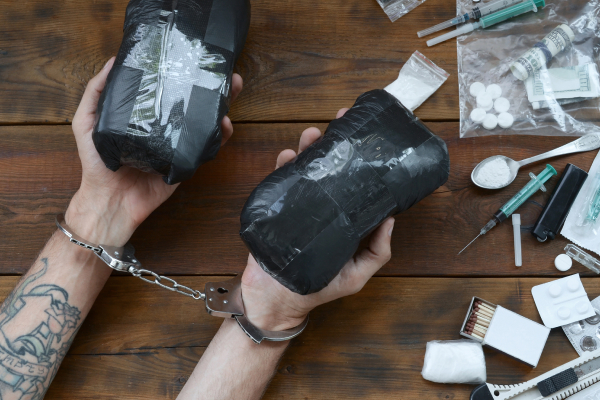What Are Miranda Rights?
Miranda Rights originated from a U.S. Supreme Court case, Miranda v. Arizona. These rights protect people from compelled self-incrimination during police questioning. When you're in police custody and being questioned, officers must warn you that:
- You have the right to remain silent.
- Anything you say can be used against you at trial.
- You have the right to an attorney.
- If you can't afford one, the court will appoint one.
These warnings ensure that any incriminating statement you give is truly voluntary. If police question you without warning you first, the admission of guilt or testimonial evidence may not be allowed in a criminal proceeding.
Miranda Rights apply only in specific settings, such as a custodial interrogation at a police station. They do not apply in every conversation with law enforcement. A criminal defense attorney can help determine if your rights were violated and how that may affect your case.
When Must Police Read You Your Rights?
Police officers must read your Miranda Rights before starting a custodial interrogation. This means you must be both:
- In police custody (not free to leave) and
- Being questioned to gather evidence for a criminal proceeding.
If both conditions are met and officers start asking you questions without warning you, they’ve violated your constitutional rights. The setting matters. Whether you're at a police station, in a patrol car, or even at your home, if a reasonable person would feel they are not free to go, it counts as custody.
It doesn't matter if the formal arrest hasn't happened yet. The moment your freedom of movement is restricted, and questioning begins, your rights should be read.
If the police skip this step, anything you say may be considered an un-Mirandized statement. That statement could be challenged and excluded from use at trial by your criminal defense attorney.
What Happens If They Don’t?
If police fail to read your Miranda Rights, your incriminating statement may be excluded from use at trial. This protects you from compelled self-incrimination, a key part of your constitutional rights under the Self-Incrimination Clause of the Fifth Amendment.
But there's a limit. A Miranda violation doesn't always mean the case will be thrown out. It only blocks the use of the statements made during that custodial interrogation. In many cases, physical or nontestimonial evidence (like drugs or weapons) might still be used, depending on how it was found.
If police used your unwarned statements to find that evidence, your lawyer might still challenge its admission into evidence using the exclusionary rule or the poisonous tree doctrine.
These situations are complex. That’s why having a skilled criminal defense attorney matters. They can review the facts, challenge unlawful police actions, and protect your rights throughout the criminal proceeding.
The Exclusionary Rule and Miranda Violations
 The exclusionary rule is a legal tool that protects your constitutional rights. If the police get evidence in the wrong way, your lawyer can ask the court to throw it out.
The exclusionary rule is a legal tool that protects your constitutional rights. If the police get evidence in the wrong way, your lawyer can ask the court to throw it out.
Here are key ideas that explain how this rule works in Miranda cases and how it differs from other rights violations:
What Is the Exclusionary Rule?
The exclusionary rule stops courts from using evidence that was obtained through a violation of your rights. If police violate your Miranda Rights, the incriminating statement you gave may not be allowed at trial.
This rule exists to discourage illegal behavior by law enforcement officers. If they know the evidence will be thrown out, they’re more likely to follow proper procedures.
However, this rule usually applies to testimonial evidence, like a confession or admission of guilt. It does not always apply to physical evidence, even if that evidence was found because of an unwarned statement. That’s where the law gets more complicated and why it’s important to work with a criminal defense attorney who understands how to apply it.
Difference Between Miranda Violations and Fourth Amendment Violations
|
Type of Right Violated
|
Self-Incrimination Clause of the Fifth Amendment
|
Protection against unreasonable searches
|
|
Applies to
|
Custodial interrogation
|
Physical search or seizure
|
|
Common Violation
|
No Miranda warning before police questions
|
No search warrant
or lack of probable cause
|
|
Main Evidence Affected
|
Statements and confessions
|
Physical evidence like drugs or weapons
|
|
Possible Remedy
|
Suppression of incriminating statements
|
Exclusion of evidence at trial
|
|
Can Still Use Evidence?
|
Sometimes yes, especially tangible evidence
|
Usually no, unless under legal exceptions
|
How Miranda Applies to Statements, Not Always Physical Evidence
Miranda protects statements, not necessarily physical evidence. If the police get a confession without reading your rights, that involuntary statement may be thrown out. But if the statement led to tangible evidence, courts might still allow it.
The Supreme Court has ruled that a Miranda violation does not always trigger the exclusionary rule for physical objects. This is especially true when the statement is not forced or coerced. For example, if someone says, "The gun is in my closet," without being read their rights, the court might block the statement but still allow the gun as evidence.
This is a gray area in many cases. Courts look at how the evidence was found, how serious the violation was, and whether the statement was truly voluntary. An experienced criminal defense lawyer can push to have both the statement and the physical item excluded.
Can Physical Evidence Be Used If It Was Found Because of a Miranda Violation?
Even when police violate Miranda Rights, the rules about physical evidence are not always clear. Courts treat tangible evidence differently than statements, especially if the statement wasn’t forced.
Some of the legal ideas that affect whether that evidence stays in or gets thrown out include:
The "Fruit of the Poisonous Tree" Doctrine
The fruit of the poisonous tree doctrine is a legal rule that blocks evidence found through illegal actions. If your rights were violated, and that led to more evidence, your attorney may be able to stop it from being used in court.
In cases of Miranda violations, though, this rule doesn't always apply the same way. Courts often say that Miranda is a prophylactic rule, meant to protect against compelled self-incrimination, but not always tied to the way police find physical evidence.
If the police acted in bad faith, or the statement was clearly forced, then the derivative evidence might be excluded. Otherwise, courts may still allow it.
Example Scenarios
Let’s say you are taken into police custody and questioned without being read your rights. You tell officers where they can find illegal items, such as weapons or drugs.
In most cases, the un-Mirandized statement itself cannot be used at trial. However, physical evidence (like weapons) might still be allowed, depending on how the court sees it.
Here’s another example: if the police used threats or pressure during the questioning, your lawyer could argue the confession was involuntary. That might block both the statement and the evidence of guilt it led to.
Every detail matters. Where the questioning happened, how it was done, and your mental state all influence how the court will treat the evidence.
Courts May Still Admit the Evidence
Courts often admit tangible evidence even when it was found through a Miranda violation, especially when the statement was voluntary. Judges tend to focus more on how the evidence was found, not just on whether your rights were read.
Unless there was clear coercive police conduct, such as threats or trickery, the court may allow the evidence at trial. This is especially true if public safety was involved or if the same evidence could have been found in another way.
This legal approach frustrates many defendants. That’s why you need a strong criminal defense attorney who understands these rules and knows how to challenge the admission into evidence. The goal is to show that the evidence was tied directly to a rights violation and should be thrown out.
When Might Tangible Evidence Be Suppressed?
 Not all physical evidence found after a Miranda violation will be used in court. Sometimes, the court will agree to block it. The key is proving that the way it was found crossed a legal line.
Not all physical evidence found after a Miranda violation will be used in court. Sometimes, the court will agree to block it. The key is proving that the way it was found crossed a legal line.
Here are some situations where the court may suppress tangible evidence.
If the Statement Was Coerced or Involuntary
If your incriminating statement was forced or pressured, the court may find it involuntary. An involuntary confession obtained through pressure violates your constitutional rights. This includes threats, sleep deprivation, or false promises of release.
When the police use this kind of pressure, both the statement and the physical evidence that came from it may be blocked. Courts do not allow evidence tied to a clear rights violation. This is especially true if the statement came during a custodial interrogation without legal warnings.
Your criminal defense lawyer can argue that the involuntary statement taints anything that follows.
If Police Misconduct Was Especially Egregious
Some police conduct is so bad that the court will suppress any evidence that results from it. This includes clear abuse, ignoring basic rights, or breaking laws during questioning.
If law enforcement officers act in a way that shocks the court, even tangible evidence can be excluded. For example, if officers lie about having a search warrant or use illegal threats to get you to talk, a judge may throw out all the resulting evidence.
Judges look at intent, behavior, and whether the officer ignored your Miranda Rights or failed to uphold them. Serious violations can shift the outcome of a case.
If Evidence Couldn’t Have Been Found Otherwise
If the only reason police found the physical evidence is because of your unwarned statements, that evidence may be suppressed. This argument works best when the police have no other leads or tips.
This is called showing the evidence as the “fruit” of the poisonous tree. Without the illegal confession, there would have been no way to find it. If your attorney can prove that, the court may block the admission into evidence.
But if officers can show the item could’ve been found through other legal steps, it may still be allowed. Your attorney’s job is to argue that the evidence was entirely dependent on the violation of the rights.
Legal Strategies If Your Rights Were Violated
If your Miranda Rights were ignored or your statement was taken without consent, you are not powerless. A skilled criminal defense attorney can use several legal tools to protect your rights and fight back.
Here are a few ways lawyers challenge illegal statements and the evidence that follows.
Motion to Suppress Evidence or Statements
One of the first steps your lawyer may take is filing a motion to suppress. This asks the court to block any incriminating statements, confessions, or physical evidence tied to a Miranda violation.
If the judge agrees that police violated your rights, the court may exclude anything gathered through that violation. This can include testimonial evidence, tangible evidence, or even derivative evidence.
Winning a suppression motion can weaken the state’s case and may lead to dropped charges or a better plea deal. These motions require clear facts and strong arguments. Your lawyer will look at every part of the arrest and custodial interrogation.
Challenging the Validity of the Confession
Not every confession is legal. If your lawyer can prove that your statement was not given freely, it may be considered an involuntary confession.
Courts consider several things:
- Your mental and physical state
- The length and location of the questioning
- Whether you understand your constitutional rights
- Whether the police used pressure, threats, or lies
A confession involuntary under any of these conditions can be excluded. This often helps block both the statement and any evidence of guilt it led to. A criminal defense attorney will investigate the context of your confession and gather proof to show it should not be used at trial.
How Our Criminal Defense Lawyer Can Help
A Miranda violation can change the outcome of your case, but only if you have the right lawyer to fight it. Summit Defense Criminal Lawyers knows how to challenge improper police conduct and protect your constitutional rights every step of the way.
Our team will start by reviewing the entire arrest and custodial interrogation. We’ll look at whether you were truly informed of your Miranda Rights and whether any incriminating statement or tangible evidence was gathered illegally.
If the police made errors, we could file motions to suppress the evidence at trial, expose coercive police conduct, and argue that your statement was a result of improper questioning. Whether you’re facing domestic violence, drug charges, or another offense, we’ll build the best strategy possible.
FAQs
 If the police arrest you and ask questions without reading your Miranda Rights, anything you say might be tossed out. But what if that statement leads to a gun, drugs, or other tangible evidence? Can that still be used in court?
If the police arrest you and ask questions without reading your Miranda Rights, anything you say might be tossed out. But what if that statement leads to a gun, drugs, or other tangible evidence? Can that still be used in court?

 The exclusionary rule is a legal tool that protects your constitutional rights. If the police get evidence in the wrong way, your lawyer can ask the court to throw it out.
The exclusionary rule is a legal tool that protects your constitutional rights. If the police get evidence in the wrong way, your lawyer can ask the court to throw it out. Not all physical evidence found after a Miranda violation will be used in court. Sometimes, the court will agree to block it. The key is proving that the way it was found crossed a legal line.
Not all physical evidence found after a Miranda violation will be used in court. Sometimes, the court will agree to block it. The key is proving that the way it was found crossed a legal line. If police questioned you without reading your Miranda Rights, you may be able to challenge the statements, evidence, or even the entire case. Whether you're facing charges related to domestic violence, drugs, or another crime, a violation of your rights can make a major difference in how the case unfolds.
If police questioned you without reading your Miranda Rights, you may be able to challenge the statements, evidence, or even the entire case. Whether you're facing charges related to domestic violence, drugs, or another crime, a violation of your rights can make a major difference in how the case unfolds.